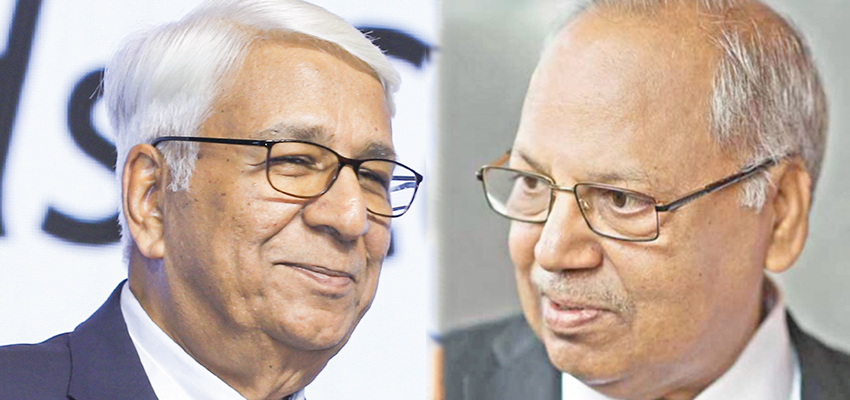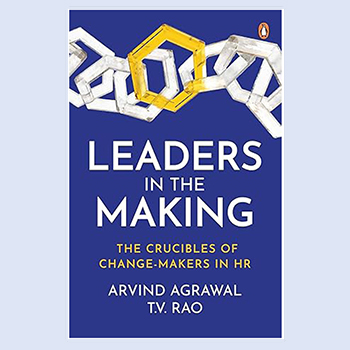Leaders in the Making

Some are born leaders, while others have to navigate the path of sacrifices, problems, and obstacles to become leaders. Steadily, these individuals acquire the traits of becoming a successful leader through perseverance, determination, and a willingness to adapt. With the objective of helping students acquire the quality of leadership, a panel discussion on "Leaders in the Making" was conducted during the NHRDN-SBUP Student Chapter inauguration event at Sri Balaji University, Pune. Prof. T.V. Rao, Chairman, T.V.R.L.S., a renowned authority in the field of leadership development led the discussion, while Dr. Arvind Agarwal, Managing Partner, Lead Associates and Partner at Global HR Lead Partners LLP, joined him as a panellist. Manisha Shukla, Head, MDP Department, SBUP, expertly moderated the session. Corporate Citizen brings you the thought-provoking dialogue on making the next generation of leaders. Read on...
"Failures are a part of life, and without them, you can never become a better human being. Failures exist, and one must embrace them. Everything is transient; nothing is permanent and that's the way to look at. You have to develop that philosophy"
-T.V. Rao
Manisha Shukla: What exactly inspired you (Arvind Agarwal) to write this power packed book ‘Leaders in the making’?
Arvind Agarwal: Embarking upon this journey of writing a book was quite a daunting task by itself. The book is so power packed because I have taken inspiration from very powerful people. I used to see them in action—people like Anil Khandelwal, Former Chairman of Bank of Baroda; Anil Sachdev, serial entrepreneur who has started Consulting institutes, Consulting companies and management institutes; Aquil Busrai who was the CEO of people practices in Malaysia for Shell; Dr. Ashok Balyan who was Managing Director of Petronet—these have been very powerful legends and I used to think what kind of life they have lived and how have they become who they are. That curiosity led me to embark upon this book. Of course I was very clear that I'm not embarking upon this book which I mentioned is a daunting task, without veteran and serial author and my mentor, Dr. T.V. Rao, holding my hand. Once I got his consent, I was very excited and moved forward in terms of writing this book.
Q: What exactly leadership means to you and how can the management students move on this path of leadership?

T.V. Rao: When I asked myself this question, I came to one conclusion that everyone is born as a leader with the potential to be a leader. But, it depends on how you navigate your life and what you bring out within. We are all both beneficiaries and victims of circumstances. Some of us are victims of circumstances because the place you were born, the kind of experience you had, probably don't let you do many things. However, without a doubt, even if you are born in circumstances that were not favorable to you, there are people who have done wonderful things. This makes us feel that leadership is not an inborn thing. It is a way you orchestrate your life. So, my definition of leadership is nothing but impacting, influencing, changing the thinking, talking actions, or anything of these. The moment you make an impact on somebody else and change either the way of thinking or the way of doing things, you are a leader. That's a very broad definition that fits in well with what has been said; there is no one definition. I believe that you can define your own leadership qualities. You just have to be constantly searching within, look for opportunities, create opportunities, and make it happen. Leadership is within you; it depends on what you make of yourself; it is not necessarily ascribed by somebody else. And if you do this, you may also one fine morning find yourself figuring in books like what we have written in this book.
Q: What were the core concepts that you (Dr Arvind Agrawal) believed in, that are crucible for leadership as highlighted in this book?
Arvind Agrawal: When you look at leadership, there are so many different constructs and frameworks that one can easily get lost. However, both Professor Rao and I have been greatly impressed by the thought of the crucible of experiences. The whole concept of crucibles, which Warren Bennis and Robert Thomas brought up, mentions that we all go through crucible experiences. These experiences could be positive or even traumatic and we all go through many of these in our lives. So, we used this whole concept of the crucible. We tried to understand from the people whom we interviewed what were the crucible moments they went through in their early childhood, including their school life, colleges, and professions. That is what this book talks about, and that's the construct we use.
Q: What exactly made you use this word “Baking of the leaders” in this book "Making of the leaders”?
Arvind Agrawal: It connects to the whole concept of the crucible because when you put something in the crucible, it gets baked. So, leaders develop over a period by experiencing both positive and negative situations. By going through both positive and negative experiences, you learn. Because, every experience is a learning experience, and every experience bakes you and makes you an effective leader.
Q: In this book, are there any strategies or actionable steps outlined that the readers could implement to enhance their leadership skills?
Arvind Agrawal: The entire book is devoted to that, and as a student, you can pick up any case study that appeals to you. Each of these 30 sections is interdependent, and not only can you read them, but you can also go online to learn more because much has been written about these legends. We have captured only a small slice of their lives, but you can go online and watch their videos, interviews and stories, beyond what is written.
The last section talks about the lessons that one can learn from these case studies. So, if students read the chapter on lessons, it provides many pointers for them to connect with those lessons. It will help them embrace these lessons and benefit from them. In the end, there is an appendix that discusses how you can self-evaluate your competencies, which are necessary for being a leader. Based on these 30 case studies, you can do a self-assessment of your competencies and values, which are important for personal growth as a leader. These are things you can do to develop yourself as a leader for the next generation. There are self-reflection exercises at the end of the book that enable readers to assess their leadership skills and plan their actions moving forward
Q: How can we develop a more structured programme on this book so that the intended objective of enabling aspiring leaders to become changemakers can be achieved?
T.V. Rao: First, I believe that the responsibility of designing the course certainly lies with some of the faculty of any institution. They must first read the book and some of the references given there, all of which are very interesting. So, one should read the books and design a curriculum; leadership can be as simple as impacting others. Everyone has a point of view. In fact, when I used to teach a class on talent management, I would ask the students, "What is your point of view?" They start listing so many things on which they have a point of view. For example, how they got admitted to engineering or commerce? or Whether others should follow the same path or take a different one? or How they passed the Common Admission Test exam? Upon this question, somebody replied that he could write books on it. Having a point of view can be as simple as that.
Thus, you design a course in which we teach some of these leadership qualities. Now leadership is not a great thing just because these 30 people have done remarkable things, and we used some 12 criteria. However, that does not mean these are the only 30 people on Earth; there may be more but remember at one point they were also like students. But there is a difference some of these individuals took projects seriously. When given a task by a professor to work, they did that work and learned a lot. When given their first job to maintain the attendance register or to screen 2,000 applications, they saw it as a great learning opportunity. Someone else might have considered it a headache or thought it could be done by a computer, but these individuals saw it as the best way to learn and started seeing learning in everything. This is what our course should do - sensitise people to crucible experiences.
Making an experience a crucible experience depends on you; the course you design should help students recognise the leadership qualities within them. Few years ago, many went through a course at IIM Ahmedabad run by Professor Pulin Garg. He took groups of people for three to four days to an outside sensitivity camp, where they shared life experiences. One of them was Ajay Banga, who is now the president of the World Bank. Another was Arvind Agrawal, who also attended Pulin Garg’s course.
Design a course in a way that students get sensitised to their inner talent, develop a purpose, and go through this. These leadership stories are great for stimulating their thinking, so you should have both experiential and conceptual courses to stimulate them.
If you go online, we have made some recommendations on how such a course can be designed. I have provided a 30-session outline, which would be wonderful. The course content should evolve each year as you grow.
One last thought: if professors do not offer a course like this, could the Student Chapter organise a course on preparing leaders for the future? It doesn't have to be 30 sessions; it can be 10 or even five sessions. If students can design a course for themselves, I think that would be even better than professors designing one. I'm sure one day it will make a big impact, and the NHRD network will be more than happy to facilitate any such initiative from the students.
"Because there is success, don't gloat that you did it, as much as don't drown yourself in sorrow when there is a failure. One has to take success and failure both with 'equanimity', what we call emotional maturity and that capability, is fundamental to moving forward in life as a leader"
-Arvind Agrawal
Q: What advice would you give the leaders of tomorrow, considering the setbacks and failures they may face in professional life?

Arvind Agrawal: Failure is the reality of our life ahead. It has been so, but more frequently it's likely to occur going forward, and we all seem to know how to cope with success. But in this book, there are some crucible moments shared by some of the leaders about how they have coped with failure. I would like to share one which is recounted by Rajiv Dubey, when he was the managing director of Rallis, a Tata group company. He had successfully turned around the company, but notwithstanding the success, he had some variance of views with the board of directors of Rallis. The differences were so acute that ultimately, he decided to leave the company. He was crestfallen that a company which he had turned around did not even give him a farewell. After serving in the Tata group for more than 25 years, some of these may be very confidential, but Rajiv chose to share and gave me permission to put that in the book. So, it's there on the pages of the book, and I'm sharing it.
When I was meeting Rajiv in his office, he turned back and dived into his briefcase and picked up a copy of Bhagavad Gita. In that, he showed me lines underlined by his father. It said, in summary, a very simple thing "Whatever happens, whether it's success or failure, it is not just your doing; there are so many other factors that come into play and produce the result". So, because there is success, don't gloat that you did it, as much as don't drown yourself in sorrow when there is a failure. One has to take success and failure both with 'equanimity', what we call emotional maturity, and that capability is fundamental to moving forward in life as a leader. You have to have an ecosystem of people who you can reach out to. They may be your family members, they may also be your close friends, or they may be your teachers. So, it's very important to develop a close connection with a few people that you can turn to. Like in the case of Rajiv Dubey, he turned to his father; so you should always have a few people that you can turn to. Life is full of surprises—success as well as failures—you don't have to walk it alone.
T.V. Rao: Failures are lessons or blocks that will build the future. I recently interviewed a boy who mentioned to me that he took up the job of a cultural secretary at IIT Madras, and the event was running at a loss. That year, they decided to turn it into a great success. It was a collaborative effort among students. During that time, floods hit Chennai, former Chief Minister of Tamil Nadu J. Jayalalithaa passed away, demonetisation took place, and one negative event followed another. However, in the end, he ensured its success. He managed to leave behind several lakhs of rupees, which were sufficient to fund the event for the next three to four years. When I asked him, “What made you do this?”, he responded, “passion and commitment to a purpose. If you are committed to a purpose, every challenge becomes a valuable learning opportunity.”
Failures are a part of life, and without them, you can never become a better human being. Failures exist, and one must embrace them. Everything is transient; nothing is permanent and that's the way to look at. You have to develop that philosophy.